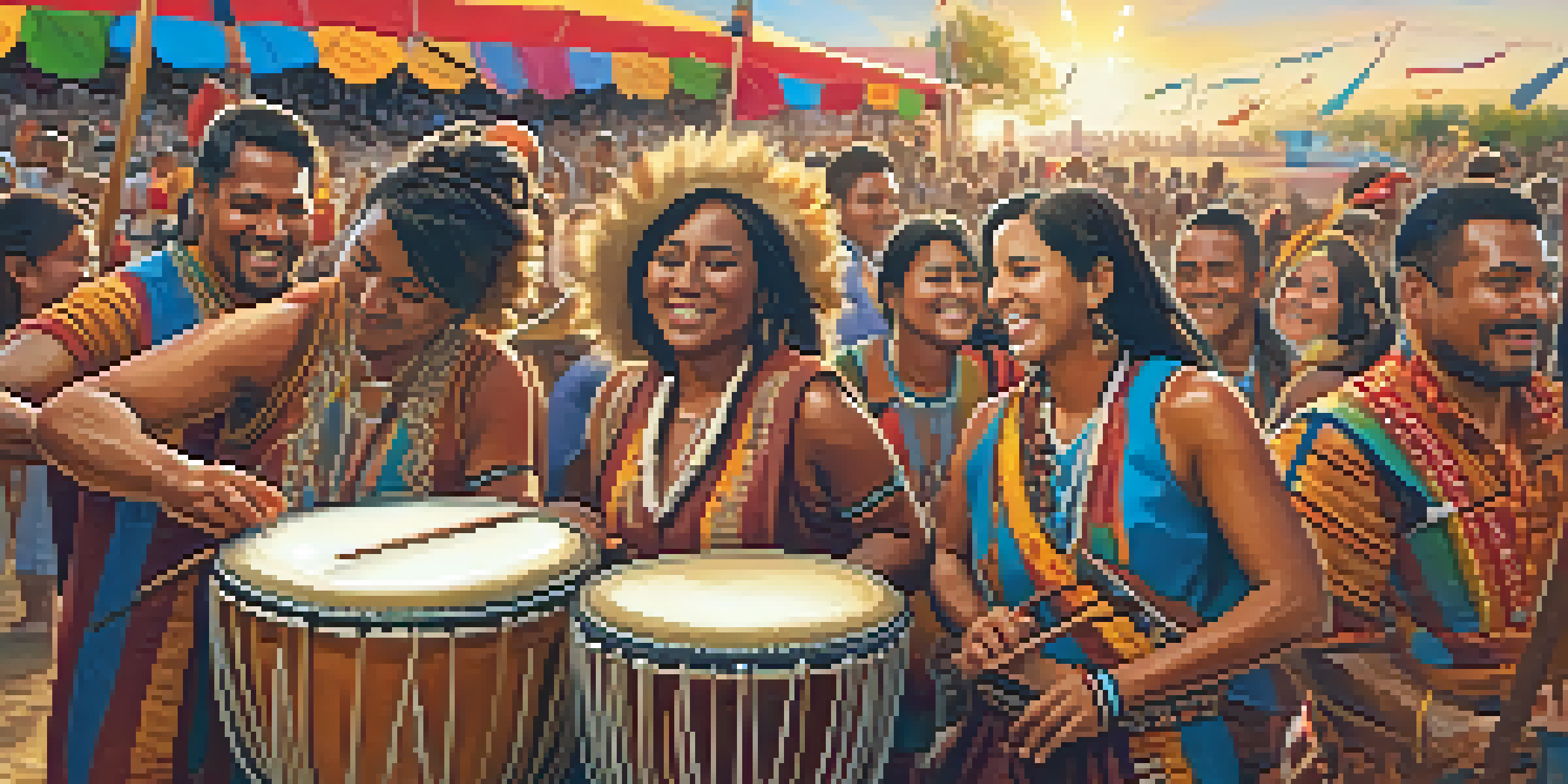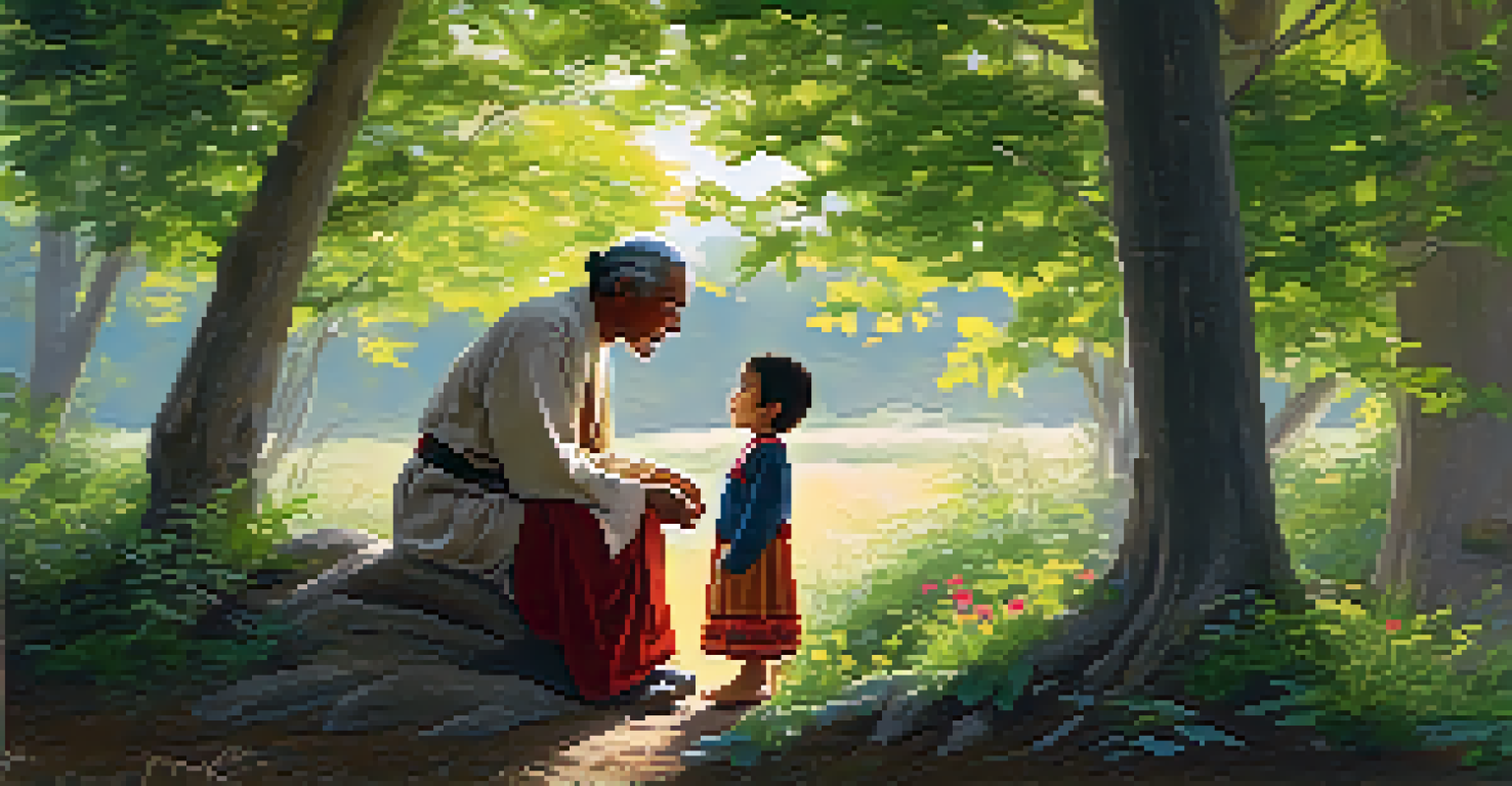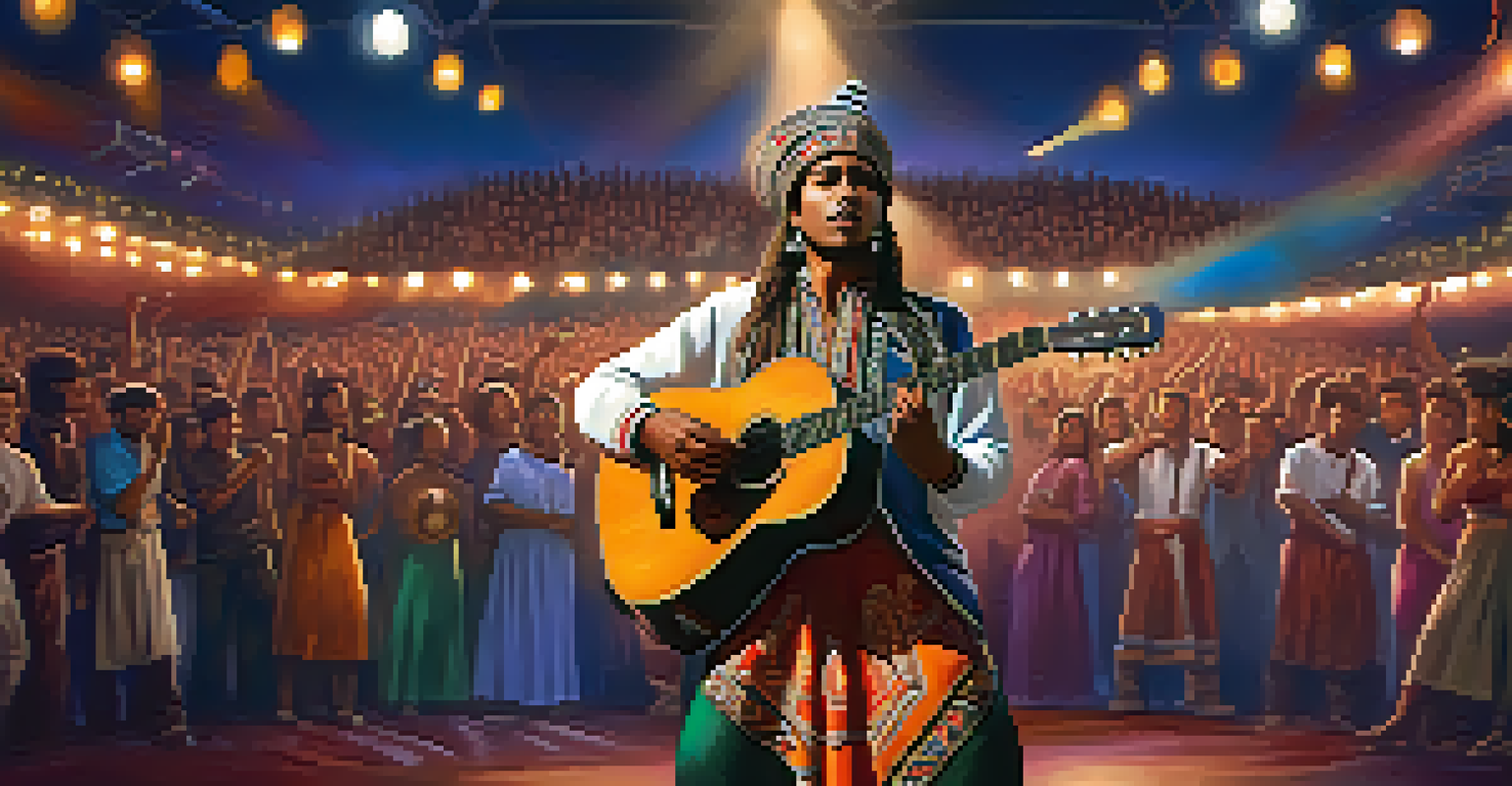Cultural Significance of Music in Indigenous Communities

Music as a Storyteller of Indigenous History and Identity
Music in Indigenous communities often serves as a vibrant storyteller, weaving together the rich histories and identities of the people. Through songs, oral traditions are preserved, allowing younger generations to connect with their ancestors' experiences. This practice is not just a form of entertainment; it’s a crucial way to maintain cultural heritage and foster a sense of belonging.
Music is the shorthand of emotion.
For instance, many Indigenous songs recount significant events, legends, or teachings that shape community values and beliefs. These narratives are not only entertaining but also serve as educational tools, imparting wisdom and life lessons. By engaging with this music, listeners can gain insights into the struggles and triumphs that define their cultural landscape.
Moreover, the unique styles and instruments used in Indigenous music often reflect the environment and resources available to each community. This connection to the land reinforces the relationship between the people and their surroundings, emphasizing the importance of nature in their identity.
Rituals and Ceremonies: The Heartbeat of Indigenous Cultures
In many Indigenous cultures, music plays an integral role in rituals and ceremonies, marking important life events such as births, marriages, and funerals. These occasions often feature traditional songs that invoke spiritual connections and celebrate the cycle of life. Music, in this context, becomes a channel for expressing emotions and honoring ancestors.

For example, a Native American powwow combines dance, drumming, and singing to create a communal celebration that strengthens bonds among participants. The collective experience fosters unity, reminding individuals of their shared heritage and collective responsibility. Such events highlight how music serves as a communal heartbeat, bringing people together in moments of joy and reflection.
Music Preserves Indigenous Heritage
Indigenous music acts as a vital storyteller, preserving cultural histories and identities through songs that connect generations.
Additionally, the use of music in healing ceremonies illustrates its power to restore balance and well-being. Songs and chants are often performed to invoke spiritual guidance, helping individuals and communities navigate challenges. This therapeutic aspect of music underscores its profound significance beyond mere entertainment.
Preservation of Language Through Indigenous Music
Many Indigenous languages are endangered, yet music plays a vital role in their preservation. Songs often incorporate native languages, allowing communities to pass down linguistic knowledge through generations. By singing in their native tongue, Indigenous people not only celebrate their language but also keep it alive in a world where it may otherwise fade away.
The power of music makes all the difference in the world.
For instance, some Indigenous artists create music that blends contemporary styles with traditional languages, making it accessible to younger audiences. This fusion can spark interest in learning the language, bridging the gap between the past and the present. As young people engage with these songs, they are more likely to appreciate their heritage and contribute to its preservation.
Moreover, music serves as a powerful tool for cultural revitalization. Community workshops and initiatives often incorporate music to teach younger generations about their language and traditions, fostering a sense of pride and belonging. By engaging with their musical heritage, Indigenous people actively work to ensure that their languages thrive.
Music as a Means of Resistance and Empowerment
Throughout history, music has been a vehicle for resistance among Indigenous communities, offering a powerful means of expressing dissent and challenging oppression. Songs often reflect the struggles faced by these communities, addressing issues such as land rights, cultural erasure, and social justice. In this way, music becomes a form of activism, empowering individuals to stand up for their rights.
For example, contemporary Indigenous musicians often use their platforms to raise awareness about social and environmental issues. Their lyrics may speak directly to the injustices faced by their communities, resonating with listeners who share similar struggles. This connection fosters solidarity and encourages collective action, demonstrating the role of music as a catalyst for change.
Music Fosters Community Connections
In rituals and ceremonies, music serves as a communal heartbeat, bringing people together to celebrate life events and reinforce shared heritage.
Additionally, music festivals and events that celebrate Indigenous culture often create spaces for healing and unity. By coming together to share their stories through music, communities reinforce their resilience and strength. This sense of empowerment is crucial in the ongoing fight for recognition and rights.
The Role of Music in Intergenerational Connections
Music serves as a bridge between generations in Indigenous communities, fostering connections that span age groups. Elders often share traditional songs with younger members, passing along valuable cultural knowledge and reinforcing community bonds. This exchange not only enriches the younger generation's understanding of their heritage but also strengthens the identity of the community as a whole.
For instance, during family gatherings or community events, storytelling through music becomes a way for elders to impart wisdom and life lessons. These moments create lasting memories and deepen relationships, ensuring that the cultural narrative continues to thrive. In this context, music acts as a living archive of collective history, preserving the essence of the community.
Furthermore, programs that encourage youth to engage with traditional music help cultivate a sense of responsibility toward their heritage. By participating in music-making, young people learn the importance of their cultural roots and develop a commitment to keeping those traditions alive for future generations. This intergenerational exchange is essential for the continuity of Indigenous culture.
The Evolution of Indigenous Music in Modern Contexts
As Indigenous communities navigate the complexities of modern life, their music continues to evolve while retaining its cultural significance. Contemporary Indigenous artists often blend traditional sounds with modern genres, creating a unique fusion that resonates with diverse audiences. This evolution not only reflects changes in society but also serves as a means of cultural adaptation.
For example, many Indigenous musicians incorporate elements of hip-hop, rock, or electronic music into their work, making it relevant to younger generations. This blending of styles allows for a broader expression of identity and experiences, showcasing the dynamic nature of Indigenous culture. Such innovations challenge stereotypes and expand the audience's understanding of what Indigenous music can be.
Modern Music as Cultural Adaptation
Contemporary Indigenous artists blend traditional sounds with modern genres, showcasing the evolution of their music while addressing current social issues.
Moreover, the accessibility of digital platforms has enabled Indigenous artists to share their music globally. This exposure fosters greater appreciation for Indigenous cultures and encourages dialogue about important issues faced by these communities. In this way, modern Indigenous music acts as both a celebration of heritage and a platform for advocacy.
The Global Impact of Indigenous Music and Culture
Indigenous music has transcended geographical boundaries, influencing global music scenes and contributing to cultural diversity. As Indigenous artists gain recognition, their music introduces audiences worldwide to the richness of their traditions. This exchange not only enriches the global music landscape but also promotes understanding and respect for Indigenous cultures.
For instance, collaborations between Indigenous musicians and artists from other genres often result in unique musical blends that celebrate cultural diversity. These partnerships highlight the importance of cross-cultural dialogue and emphasize the shared human experience. By embracing Indigenous music, audiences can engage with stories and perspectives that might otherwise remain unheard.

Additionally, initiatives that promote Indigenous music often focus on raising awareness about social and environmental issues. By sharing their stories through music, Indigenous artists can spark conversations that lead to greater understanding and action. This global impact underscores the significance of Indigenous music in fostering cultural appreciation and social change.